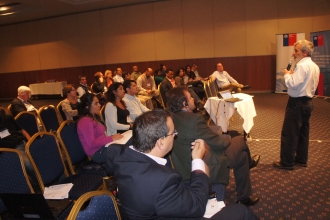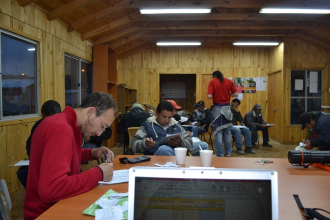Aquaculture Research
Jorge Dresdner wrote an opinion article about research in Chilean aquaculture.
Jorge Dresdner wrote an opinion article about research in Chilean aquaculture.
Jorge Dresdner wrote an opinion article about discards in Chilean fisheries.

The objective of the workshop was to develop a scientific discussion in which we can think about the state of the art in Natural Resource Economics and the Environment in Chile. Specialists, who are…

The objective of the workshop was to develop a scientific discussion in which we can think about the state of the art in Natural Resource Economics and the Environment in Chile. Specialists, who are…
This project will use the tools of experimental economics to study behavioral issues related to both the protection of a common-pool resource from poaching by outsiders, and the enforcement of rules and norms to maintain compliance within a group. The experiments are motivated by the Chilean abalone (loco) fishery and will be conducted in the field with members of local artisanal fishing organizations.

This project will use the tools of experimental economics to study behavioral issues related to both the protection of a common-pool resource from poaching by outsiders, and the enforcement of rules
The illegal exploitation of wild abalone in South Africa has been escalating since 1994, despite increased enforcement, leading to collapse in some sections of its range. South Africa banned all wild abalone fishing in 2008 but controversially reopened the fishery in 2010. This paper formulates a poacher’s model, taking into account the realities of the abalone terrain in South Africa – the high-value of abalone, use of recreational drugs, the prevalence of bribery, and corruption – to explore why poaching has not subsided.
Miguel Quiroga interviewed on the effect of possible changes in maritime Chilean territory due to imminent decision of the international court of La Haya (in spanish).
“We make the connection between the fishers’ living conditions and the fish stock’s status.” The newest EfD Center is not a newcomer to influencing fisheries policy. The Research Nucleus on
The effect of social capital on the economic performance of artisanal fishermen organizations that work under a Territorial Use Rights in Fisheries (TURF) system was tested using the social networks approach. The application was based on a sample of artisanal fishers organizations that extract the locally named “loco” (Concholepas concholepas) in Central-Southern Chile. Social networks were measured through organizations’ structural properties and their bonding, linking, and bridging relationships. Economic performance was measured through per capita income.